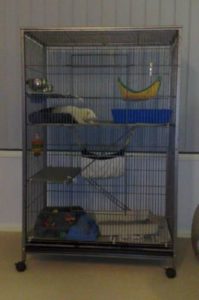Ferrets make fantastic interactive pets but there are a few considerations before adding one to your household.
Ferrets require a large amount of time. They should have 3 -4 hours per day of out of cage play and interaction time.
Housing:
They need a large multi story cage, and a spare room that can be ferret proofed for play time is useful. They do well in groups of other ferrets as they are very social animals. They can be relatively easily litter trained, a tray should be placed in a corner which the ferret chooses to toilet in. Wire surfaces should be covered to prevent injury and plenty of soft bedding should be provided. The number of sleeping areas provided should be the number of ferrets plus one, although most of the time they will sleep in a pile together. 
Ferrets are both curious and intelligent which makes them fun but can also get them into trouble! They can easily get themselves stuck in small gaps in walls, furniture, etc and can escape the house. They are good climbers and can access cupboards with ease so they are at risk of accessing toxins.
Diet:
Ferrets are strict carnivores, this means they should not be fed carbohydrates. There are commercial ferret foods available such as “Vetafarm Ferret Origins” or a premium Kitten Dry food should be available at all times. In addition they can be given human grade chicken meat such as raw chicken necks. Avoid fish as this will cause smelling stools and a greasy coat. “Greenies” can be given as a treat and to help with dental health.
Odour:
Ferrets do have a distinct odour. The odour is from the skin oils so “descenting” (which is the removal of the anal glands) is not beneficial or recommended. Desexing is the best way to minimize odour as the sebaceous glands in the skin are under hormonal influence but will not eliminate it entirely. Contrary to popular belief frequent washing does not help either, in fact it can increase production of oils and make it worse. Ferrets should not need to be washed more than once a month with a gentle shampoo. A particularly smelly or greasy ferret can be an indication of poor health or inappropriate diet.
Preventative health:
Dental disease is common so if possible brush your ferrets teeth daily. Raw chicken necks and Greenies can also be given regularly to reduce tartar build up.
We recommend health exams with your vet every 6 months as a lot can change is a short space of time with ferrets.
Ferrets should receive an annual vaccination to prevent Distemper.
Nails grow fast in ferrets so regular nail trimming will be required.
Ferrets need to be protected against heartworm which is easily done with a monthly application of “Revolution” which will also treat fleas and ear mites which are also common problems for ferrets.
Desexing is very important to prevent aggression in males and deadly anaemia in females caused by oestrogen toxicity.
Images courtesy of C. McFadyen



